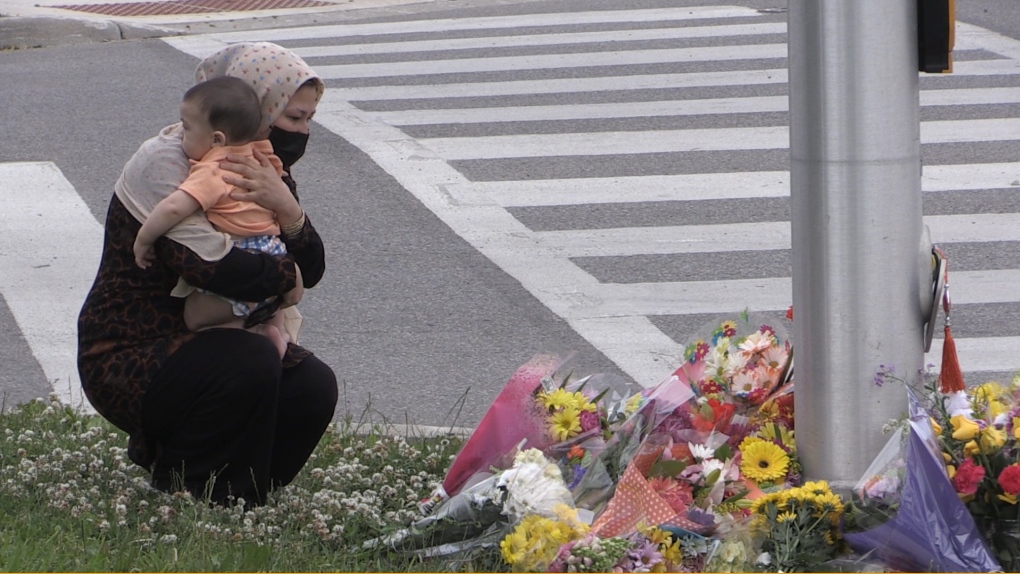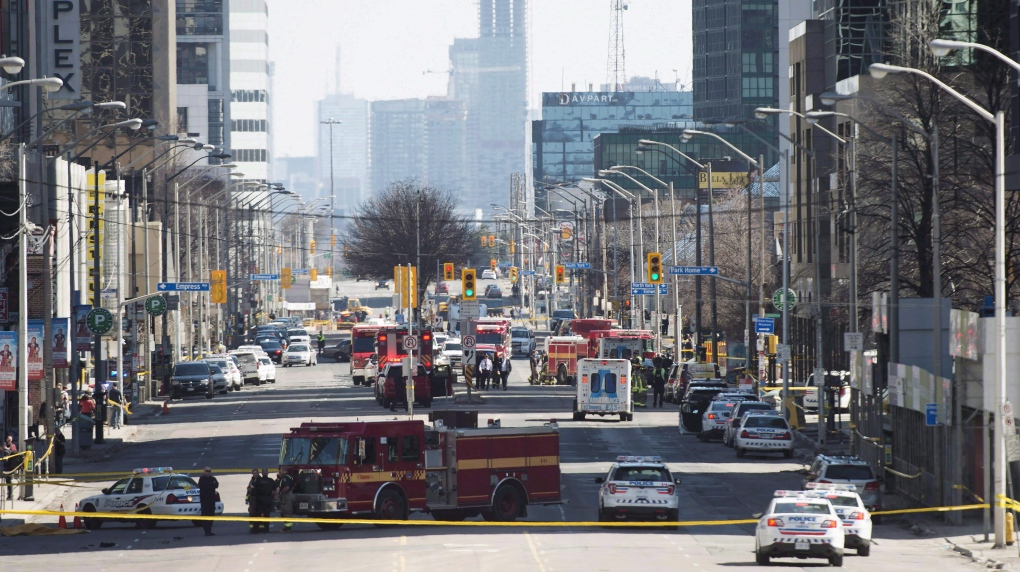'No way around it': Safety expert says vehicle attacks nearly impossible to prevent
A deadly sidewalk crash in Amqui, Que. — which police said was deliberate — has brought back horrible memories for an Imam at the London Muslim Mosque.
“It does act as a trigger,” said Imam Aarij Anwer.
In June of 2021, five members of a Muslim family who were out for a walk during a warm summer evening were struck by a pickup truck in London, Ont.
Four died and one was seriously injured. A man charged in that case faces four counts of first-degree murder and one count of attempted murder in what prosecutors allege was an act of terrorism.
In the Quebec town of Amqui on Monday, two people died and nine others were injured after being run down by a pickup truck. Police alleged the driver drove into pedestrians chosen at random, including children.
Provincial police have identified Steeve Gagnon, 38, of Amqui, as the driver, and he has been arrested and charged with two counts of dangerous driving causing death, with more charges expected in the future. Makeshift memorial in London, Ont. after a Muslim family was killed in an alleged hate-motivated attack. (Daryl Newcombe/CTV London)
Makeshift memorial in London, Ont. after a Muslim family was killed in an alleged hate-motivated attack. (Daryl Newcombe/CTV London)
Police said it is too early to determine the motive of the driver.
Anwer does stress that in his opinion, although the crashes look similar, they are not.
“The difference would be that the London family was a hate motivated crime as stated by the chief of police,” said Anwer.
He added, “It was particularly a targeted attack, an unprovoked attack on an innocent family based on their appearance and their beliefs. I'm saying this with the utmost respect for the families of the current tragedy and the victims of the current tragedy, but I don't feel comfortable that we bring that crime up in light of this particular incident.”
Former OPP Commissioner and CTV’s Public Safety Analyst Chris Lewis said that sadly, these types of tragedies are mostly unpreventable.
“There's really no way around it without solidifying the world to the point where nobody can go anywhere without being behind a barrier or a brick wall or something, and that's just not feasible,” said Lewis, who added there are times when pedestrians are protected.
He added, “It's mostly intelligence driven, but at a lot of large events we put temporary barricades up. We've had cement barricades, we've had trucks parked in key locations around protest sites, and there's a lot of permanent barricades around buildings where there's an ongoing threat.”
 First responders close down Yonge Street in Toronto after a van mounted a sidewalk crashing into a number of pedestrians on Monday, April 23, 2018. THE CANADIAN PRESS/Nathan Denette
First responders close down Yonge Street in Toronto after a van mounted a sidewalk crashing into a number of pedestrians on Monday, April 23, 2018. THE CANADIAN PRESS/Nathan Denette
Lewis cites examples of the CSIS building and embassies in Ottawa. Lewis said the only way to prevent cases like the van attack in Toronto or the case of the Muslim family in London is to pass Intel to police in advance.
“Quite often somebody says after the fact, ‘I knew he was planning something because he said this or that,’ but it’s never reported to police,” said Lewis. “After the fact is great, but it'd be nice if someone would pass those things on ahead of time that they suspect someone may be hurt and the police can then take action and try and deal with the to mitigate the ultimate impact in the loss of life.”
Anwer said nearly two years after the attack in London, he still is conscious when walking across the busy intersection with his children.
“Every time they're crossing, I am always very more concerned for them than I am for myself,” said Anwer. “I feel in due time we will return to normal state. But currently I feel the memory of that incident is still pretty raw.”
CTVNews.ca Top Stories

W5 Investigates A 'ticking time bomb': Inside Syria's toughest prison holding accused high-ranking ISIS members
In the last of a three-part investigation, W5's Avery Haines was given rare access to a Syrian prison, where thousands of accused high-ranking ISIS members are being held.
'Mayday!': New details emerge after Boeing plane makes emergency landing at Mirabel airport
New details suggest that there were communication issues between the pilots of a charter flight and the control tower at Montreal's Mirabel airport when a Boeing 737 made an emergency landing on Wednesday.
BREAKING Supreme Court affirms constitutionality of B.C. law on opioid health costs recovery
Canada's top court has affirmed the constitutionality of a law that would allow British Columbia to pursue a class-action lawsuit against opioid providers on behalf of other provinces, the territories and the federal government.
Cucumbers sold in Ontario, other provinces recalled over possible salmonella contamination
A U.S. company is recalling cucumbers sold in Ontario and other Canadian provinces due to possible salmonella contamination.
Nick Cannon says he's seeking help for narcissistic personality disorder
Nick Cannon has spoken out about his recent diagnosis of narcissistic personality disorder, saying 'I need help.'
Real GDP per capita declines for 6th consecutive quarter, household savings rise
Statistics Canada says the economy grew at an annualized pace of one per cent during the third quarter, in line with economists' expectations.
Irregular sleep patterns may raise risk of heart attack and stroke, study suggests
Sleeping and waking up at different times is associated with an increased risk of heart attack and stroke, even for people who get the recommended amount of sleep, according to new research.
Canadian news publishers suing ChatGPT developer OpenAI
A coalition of Canadian news publishers is suing OpenAI for using news content to train its ChatGPT generative artificial intelligence system.
California man who went missing for 25 years found after sister sees his picture in the news
It’s a Thanksgiving miracle for one California family after a man who went missing in 1999 was found 25 years later when his sister saw a photo of him in an online article, authorities said.


































